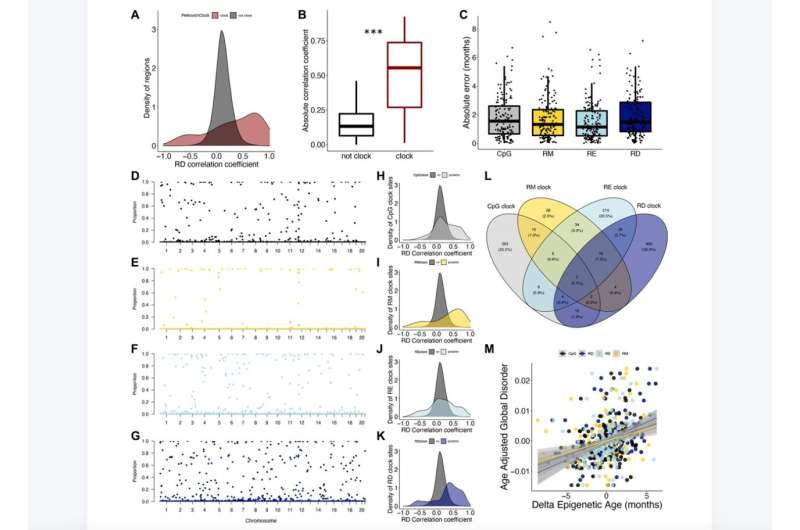This article has been reviewed according to Science X's editorial process and policies. Editors have highlighted the following attributes while ensuring the content's credibility:
fact-checked
proofread
Epigenetic drift underlies epigenetic clock signals, but responds uniquely to various factors

A new research paper titled "Epigenetic drift underlies epigenetic clock signals, but displays distinct responses to lifespan interventions, development, and cellular dedifferentiation" has been published in Aging.
Changes in DNA methylation with age are observed across the tree of life. The stereotypical nature of these changes can be modeled to produce epigenetic clocks capable of predicting chronological age with unprecedented accuracy. Despite the predictive ability of epigenetic clocks and their utility as biomarkers in clinical applications, the underlying processes that produce clock signals are not fully resolved, which limits their interpretability.
In this new study, researchers Emily M. Bertucci-Richter, Ethan P. Shealy, and Benjamin B. Parrott from the University of Georgia developed a computational approach to spatially resolve the within read variability or "disorder" in DNA methylation patterns and test whether age-associated changes in DNA methylation disorder underlie signals comprising epigenetic clocks.
"Herein, we apply novel read-based strategies to resolve age-associated epigenetic disorder across the mouse genome," the researchers explain.
The team found that epigenetic clock loci are enriched in regions that both accumulate and lose disorder with age, suggesting a link between DNA methylation disorder and epigenetic clocks. They then developed epigenetic clocks that are based on regional disorder of DNA methylation patterns and compared their performance to other epigenetic clocks by investigating the influences of development, lifespan interventions, and cellular dedifferentiation. The researchers identified common responses as well as critical differences between canonical epigenetic clocks and those based on regional disorder, demonstrating a fundamental decoupling of epigenetic aging processes.
"Collectively, we identify key linkages between epigenetic disorder and epigenetic clocks and demonstrate the multifaceted nature of epigenetic aging in which stochastic processes occurring at non-random loci produce predictable outcomes," the researchers conclude.
More information: Emily M. Bertucci-Richter et al, Epigenetic drift underlies epigenetic clock signals, but displays distinct responses to lifespan interventions, development, and cellular dedifferentiation, Aging (2024). DOI: 10.18632/aging.205503



















